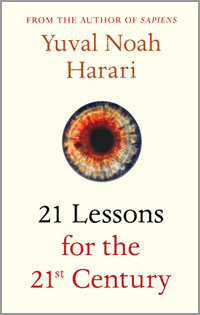21 Lessons for the 21st Century
by Yuval Noah Harari
Published by Jonathan Cape global.penguinrandomhouse.com
“Careful now”
Dougal, Father Ted.
I usually only review books I believe are worth a reader’s time and effort in this column. That will not be quite the case on this occasion. Having recommend Harari’s earlier ‘Sapiens’ (with reservations) and ‘Homo Deus’ (with even more reservations) and thus contributed by some microscopic extent to his fame as a 21st century intellectual, I feel some responsibility to those who might purchase ’21 Lessons for the 21st Century’ on the strength of that reputation. I’m afraid my reservations this time overshadow any recommendations I might make. Mostly.
In his previous works, Harari covered the great sweep of history. With ’21 Lessons’ he narrows his perspective to the more immediate future and, in so doing, loses his voice. He has reduced himself to just one more “careful now” prophet on shelves full of Cassandras. On occasion, Harari does bring his training as a professor of history to bear in ’21 Lessons’ and gives us glimpses of the grand historic perspective that was the strength of his earlier works but these bright spots are few and far between.
Harari’s narrative rambles through politics, religion, society, technology and the human mind. For the most part I can’t fault the ideas he expresses – they are clever, profound, insightful…and familiar. His politics reminds me of Noam Chomsky, his religion of Richard Dawkins, his society of Alex Evans, his technology of Max Tegmark and his insights on the mind may as well have come straight from David Eagleman. Even his “if a description of the future doesn’t sound like science fiction it’s definitely false” line, while pithy, is essentially a rephrasing of Arthur C Clarke’s 1960 intro to ‘A Vision of the Future’. Harari’s writing style is more polished and less prickly this time round but ’21 Lessons’ is like reading a book by the second guy to invent the wheel.
On top of the rewound wisdom, Harari add his own twists which more often hew towards the trivial rather than the profound. He provides a decent breakup song list, tells us about the salacious decoration in early synagogues, talks about the benefits of meditation and has an interesting take on Disney’s ‘Inside Out’. Some of his other insights are of, let’s say questionable, value. He suggests “scientists should start writing Science Fiction” but I think a couple of obscure authors such as Isaac Asimov, Robert Forward, Alastair Reynolds, EE Smith, Stephen Baxter, Ken Macleod, Carl Sagan etc, etc, etc, may have got there first. He gives a weirdly aggressive hard sell for the Buddhist world view – “that’s the truth, get over it”. And as for the pages he spends on the theme of ‘if religious folk are going to heaven why be upset about dying’? Well, he’s not wrong per se but I recall having this discussion, almost verbatim, with friends 40 years ago. It’s literally schoolboy philosophy. I kept waiting for the punchline, some clever twist to provide new depth but it never turned up.
There are great and important themes covered in ’21 Lessons’ but they’ve mostly been explored further and explained better elsewhere. The title gives the impression you are going to learn something new about the world or, at least, get original perspectives on approaching it’s many problems. Other than the doubtless unintended lesson of ‘don’t sign a three book deal if you only have two books in you’, Harari’s woolly meanderings come up wanting.
If I were to recommend the only book you were going to read this year, well, ’21 Lessons’ wouldn’t be it (try Hans Rosling’s ‘Factfulness’). Still, it does amalgamate a bunch of good ideas – even if they are somewhat mangled through Harari’s idiosyncratic filters – so I suppose you could do worse.
